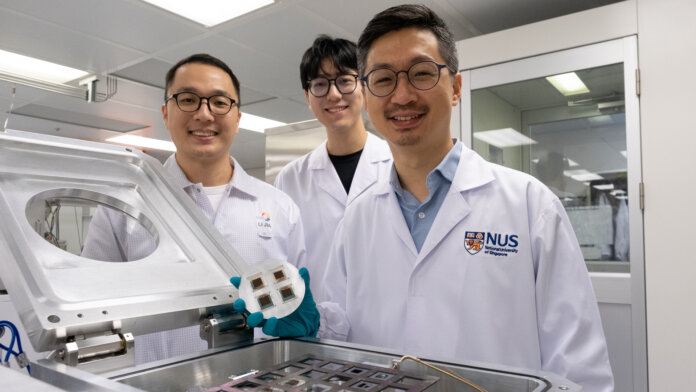A team of scientists from the National University of Singapore (NUS) recently designed new perovskite solar cells that have set a world record stabilized power conversion efficiency of 24.35% with an active area of 1 cm2. This achievement opens the door for cheaper, more efficient and durable solar cells.
Perovskites are a class of materials that exhibit high light absorption efficiency and ease of fabrication, making them promising for solar cell applications. In the past decade, perovskite solar cell technology has achieved several breakthroughs and it continues to evolve.
To enable consistent comparisons and benchmarking of different solar cell technologies, the photovoltaic community uses a standard size of at least 1 cm2 to report the efficiency of one-sun solar cells in the Solar Cell Efficiency Tables. Prior to the record-breaking feat by the NUS team, the best 1 cm2 perovskite solar cell recorded a power conversion efficiency of 23.7%.
The NUS team’s accomplishment in maximizing power generation from next-generation renewable energy sources was made by successfully integrating a novel interface material into perovskite solar cells.
“Building on more than 14 years of perovskite solar cell development, this work represents the first instance of an inverted-structure perovskite solar cell exceeding the normal structured perovskite solar cells with an active area of 1 cm2,” says Hou Yi, assistant professor at NUS and leader of the research team. “This is mainly attributed to the innovative charge-transporting material incorporated in our perovskite solar cells.”
This milestone achievement by the team was included in the Solar Cell Efficiency Tables (Version 62) in 2023 and published in the scientific journal Progress in Photovoltaics on June 21, 2023.
Assistant Professor Hou adds: “The insights gained from our current study will serve as a roadmap for developing stable, and eventually, commercially viable perovskite solar cell products that can serve as sustainable energy solutions to help reduce our reliance on fossil fuels.”




